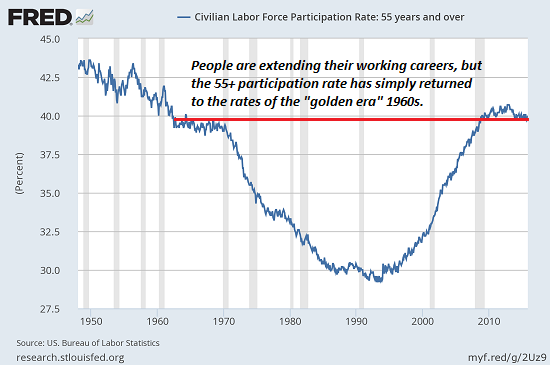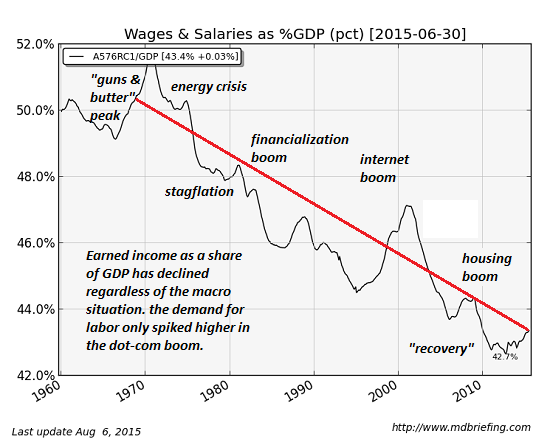How Can Older Workers Compete in an Economy That Values Youth?
April 21, 2016
If nobody will hire you, start your own enterprise to fill scarcities and create value in your community.
Workers of all ages are caught in a vise. Older workers need to keep working longer in an economy which values younger workers (and their cheaper healthcare premiums). Younger workers are caught in the vise of "you don't have enough experience" and "how do I get experience if nobody will hire me?"
Middle-aged workers are caught between the enormous Millennial generation seeking better jobs and the equally numerous baby Boom generation seeking to work a few more years to offset their interest-starved retirement funds. (Thank you, predatory and rapacious Federal Reserve for siphoning all our retirement fund interest to your cronies the Too Big to Fail Banks.)
Workers 55 and older are undeniably working longer. Here is the labor participation rate for 55+ workers:

And here's why so many workers has to work longer--earned income's share of the GDP has been in a free-fall for decades as Fed-funded financiers and corporations skim an ever greater share of the nation's GDP. (Thanks again, Federal Reserve, for hollowing out our economy to benefit the few at the expense of the many.)

Correspondent Kurt S. recently asked for advice tailored to the older worker who must re-invent or repackage themselves to find a job. Kurt reported that he found my book Get a Job, Build a Real Career and Defy a Bewildering Economy helpful, but felt that it spoke more to the younger worker than the older worker seeking to re-enter a work force bursting at the seams with workers of all ages.
To remedy that, here are some 55+-oriented suggestions that are based on the analysis of the emerging economy in my book. The reality is every sector of the economy is changing as digital technologies and automation expand--but some sectors are changing at a slower pace, which opens opportunities for older workers.
I am 62, very much an older worker with a startling 46 years in the work force (first formal paycheck, 1970 from Dole Pineapple). (Thanks to the Fed's zero-interest rate policy, I should be able to retire at 93 or so--unless the Fed imposes a negative-rate policy on me and the other serfs.)
But I recall with painful clarity the great hardships and difficulties I experienced in the recessions of 1973-74, 1981-82 and 1990-91 when I was in younger demographics. My sympathies are if anything more with younger workers, as it is increasingly difficult to get useful on-the-job experience if you're starting out.
That said, here are some suggestions for 55+ workers seeking to find work in a very competitive job/paid work market.
1. Target sectors that haven't changed much. There's a reason so many older guys find a niche in Home Depot and Lowe's--power saws, lumber, appliances, etc. haven't changed that much (except their quality has declined) for 40 years.
The same can be said of many areas of retail sales, house-cleaning, caring for children, etc.
Everyone knows the young have an advantage in sectors dominated by fast-changing technology, so avoid those sectors and stick to sectors where your knowledge and experience is still applicable and valued by employers.
2. If at all possible, get your healthcare coverage covered by a spouse or plan you pay. Those $2,000/month premiums for older workers are a big reason why employers would rather hire a $200/month premium younger worker, or limit the hours of older workers to part-time so no healthcare coverage is required.
Telling an employer you already have healthcare coverage may have a huge impact on your chances of getting hired.
3. If you have any computer-network-social media skills, you can get paid to help everyone 55+ with fewer skills. Your computer skills may not be up to the same level as a younger person's, but they are probably far more advanced than other 55+ folks. Many older people are paying somebody $35/hour or more to help them set up email, fix their buggy PCs and Macs, get them started on Facebook, etc. It might as well be you.
4. Focus on fields where managerial experience and moxie is decisive. Even highly educated young people have a tough time managing people effectively because they're lacking experience. Applying biz-school case studies to the real world isn't as easy as it looks. (I found apologizing to my older employees necessary and helpful. Do they teach this in biz school? I doubt it.)
The ability to work with (and mentor) a variety of people is an essential skill, and it's one that tends to come with age and experience.
5. Reliability matters. The ability to roll with the punches, show up on time, do what's needed to get the job done, and focus on outcomes rather than process are still core assets in a work force.
Being 55+ doesn't automatically mean someone has those skills, but they tend to come with decades of work.
6. If nobody will hire you, start your own enterprise to fill scarcities and create value in your community. The classic example is a handyperson, as it's very difficult for a young person to acquire the spectrum of experience needed to efficiently assess a wide array of problems and go about fixing them.
#3 above is another example of identifying one's strengths and then seeking a scarcity to fill. Value, profits and high wages flow to scarcity. Don't try to compete in supplying what's abundant; seek out scarcities and work on addressing those in a reliable fashion.
Every age group has its strengths and weaknesses, and the task facing all of us is to 1) identify scarcities we can fill and 2) seek ways to play to our strengths.
If you don't feel you have any strengths, focus on the eight essential skills I outline in the book Get a Job, Build a Real Career. Anyone can learn or improve these eight essential skills with some effort.
NOTE: Contributions/subscriptions are acknowledged in the order received. Your name and email remain confidential and will not be given to any other individual, company or agency.
|
Thank you, Charles C. ($100), for your outrageously generous contribution to this site -- I am greatly honored by your steadfast support and readership. |
Thank you, Daniel K. ($50), for your stupendously generous contribution to this site -- I am greatly honored by your steadfast support and readership. |

Discover why Iím looking to retire in a SE Asia luxury resort for $1,200/month. |